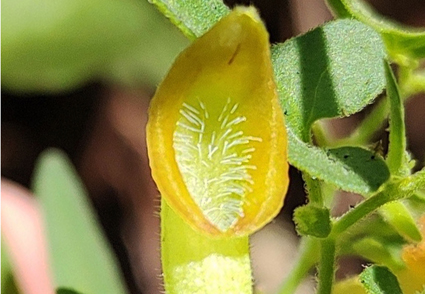Abstract
Aristolochia crocea from Atlixtac, Guerrero, Mexico, is described and illustrated as a new species. It belongs to Aristolochia subsection Pentandrae, the most diverse group of the genus in Mexico, with 48 species. The species is distinguished by its saffron-colored (yellow-orange) limb when aged, pale yellow throat, and trilobate leaf blades with the middle lobe narrowly triangular to triangular, and rounded lateral lobes. It shares morphological similarities with Aristolochia nelsonii, A. variifolia, and A. versabilifolia, for having trilobate-shaped leaves, and with A. oaxacana for the yellowish limb color. A comparative table with the main features of A. crocea and its morphologically closest species is provided, as well as an identification key, photographs, and distribution map.
References
- Aragón-Parada, J., Rodríguez, A., Munguía-Lino, G., De-Nova, J.A., Salinas-Rodríguez, M.M. & Carrillo-Reyes, P. (2021) Las plantas vasculares endémicas de la Sierra Madre del Sur, México. Botanical Sciences 99: 643–660. https://doi.org/10.17129/botsci.2682
- Bachman, S., Moat, J., Hill, A.W., de laTorre, J. & Scott, B. (2011) Supporting red list threat assessments with GeoCAT: Geospatial conservation assessment tool. e-Infrastructures for data publishing in biodiversity science. ZooKeys 150: 117–126. (Version BETA)*. ZooKeys 150: 117–126. https://doi.org/10.3897/zookeys.150.2109
- Beentje, H. (2012) The kew Plant Glossary, an Illustrated dictionary of plant terms. Royal Botanic Gardens, Kew, Richmond, Surrey, UK, 165 pp.
- González, F., Esquivel, H.E., Murcia, G.A. & Pavón-Mora, N. (2010) Aristolochia pentandra ( Aristolochiaceae ) in Colombia : Biogeographic implications and proposed synapomorphies between the Pentandrous species of Aristolochia and Its South American sister group. Rev Acad Colomb Cienc 34: 468–478.
- González, F. & Monzón-Sierra, J. (2022) An updated synopsis of Aristolochia (Aristolochiaceae) in Guatemala. Brittonia 2018: 109–140. https://doi.org/10.1007/s12228-022-09704-0
- Hickey, M. & King, C. (2000) The Cambridge Illustrated Glossary of Botanical Terms. Cambridge University Press, United Kingdom, 208 pp.
- INEGI (2017) Instituto Nacional de Estadísticas y Geografía. Continuo de Elevaciones Mexicano 3.0 (CEM 3.0). Available from: https://www.inegi.org.mx/app/geo2/elevacionesmex/ (accessed 5 April 2023)
- IUCN (2022) The IUCN Red List of Threatened Species. Version 2022-2. Available from: https://www.iucnredlist.org (accessed 17 August 2023)
- JSTOR (2023) [continuously updated] JSTOR Global Plants. Available from: https://plants.jstor.org/search?filter=name&so=ps_group_by_genus_species+asc&Query=Aristolochia (accessed 26 April 2023)
- Moreno, N.P. (1984) Glosario Botánico Ilustrado. Instituto Nacional de Investigaciones Sobre Recursos Bióticos y Compañia Editorial Continental S.A. de C.V., Xalapa, Veracruz, México, 300 pp.
- Murguía-Romero, M., Ortiz, E., Serrano-Estrada, B. & Villaseñor, J.L. (2023) The Kew’s “World Checklist of Vascular Plants” and its relevance to the knowledge of the flora of Mexico. Botanical Sciences 101: 632–653. https://doi.org/10.17129/botsci.3223
- Paizanni Guillén, A. (2016) Diversity, taxonomy and phylogeny of Aristolochia subsection Pentandrae (Aristolochiaceae). Mmaster thesis, Universidad Michoacána de San Nicolás de Hidalgo, Michoacán, Mexico, 127 pp.
- Paizanni Guillén, A., Santana Michel, F.J., Ramírez Amezcua, J.M., Wagner, S.T., Müller, S., Montero Castro, J.C., Wanke, S. & Samain, M.-S. (2016) Four new species of Aristolochia subsection Pentandrae from western Mexico. Systematic Botany 41: 128–141. https://doi.org/10.1600/036364416X690651
- Pfeifer, H.W. (1970) A taxonomic revision of the Pentandrous species of Aristolochia. The University of Connecticut publication series, Connecticut, US, pp. 1–134.
- QGIS Association (2021) QGIS.org, 3.28 Firenze, QGIS Geographic Information System.
- Sarukhán, J., Koleff, P., Carabias, J., Soberón, J., Dirzo, R., Llorente-Bousquets, J., Halfter, G., González, R., March, I., Mohar, A., Anta, S., de la Maza, J., Pisanty, I., Urquiza Haas, T., Ruiz González, S.P. & García Méndez, G. (2017) Capital Natural de Mexico. Síntesis: Evaluación del conocimiento y tendencias de cambio, perspectivas de sustentabilidad, capacidades humanas e institucionales. Comisión Nacional Para el Conocimiento y Uso de la Biodiversidad, México, 128 pp.
- Simpson, M.G. (2010) Plant Systematics. 2nd edition. Elsevier Inc., 752 pp. https://doi.org/10.1016/B978-0-12-374380-0.50001-4
- Thiers, B. (2023) [continuously updated] Index Herbariorum: A global directory of public herbaria and associated staff. New York Botanical Garden’s Virtual Herbarium. Available from: https://sweetgum.nybg.org/science/ih/ (accessed 26 April 2023)
- Wanke, S., Granados Mendoza, C., Müller, S., Paizanni Guillén, A., Neinhuis, C., Lemmon, A.R., Lemmon, E.M. & Samain, M.-S. (2017) Recalcitrant deep and shallow nodes in Aristolochia (Aristolochiaceae) illuminated using anchored hybrid enrichment. Molecular Phylogenetics and Evolution 117: 111–123. https://doi.org/10.1016/j.ympev.2017.05.014


